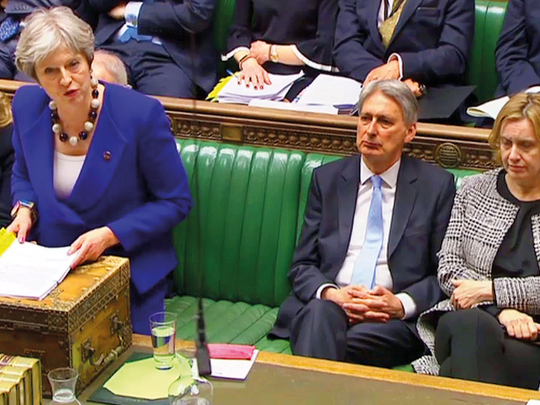
London: Beleaguered, embattled, hapless — as the Windrush scandal worsened over recent days, these doom-laden adjectives had begun attaching themselves irresistibly to Amber Rudd’s name.
To the last, she and her allies continued to insist that she didn’t know about deportation targets — they maintain the government’s “ambition” for boosting the number of people sent home is not a “target”.
But crucially in her resignation letter, Rudd admitted “information provided to my office”did “make mention of numerical targets”. She didn’t see that information, she said — but admitted she should have done.
Michael Gove, who defended Rudd robustly on Saturday morning, had already said the memo leaked to the Guardian on Friday had never appeared in the home secretary’s red box.
But that simply raised more questions: why not? Why had officials and advisers assumed the existence of numerical targets for chucking people out of Britain was something the home secretary would be sufficiently comfortable about not to have to ensure the details were brought to her attention and formally approved?
Even on Sunday afternoon, senior Tories were suggesting that if Rudd could endure another mauling at the hands of Diane Abbott, Yvette Cooper and David Lammy on Monday, she could put the scandal behind her.
But the Windrush fiasco has left a trail of devastated lives — and whatever did or did not find its way into her ministerial inbox, making fine distinctions about the precise meaning of the word “target” had begun to look increasingly crass.
Certainly, neither Gove — who claimed the leaks were aimed at distracting from Labour’s anti-Semitism crisis — nor Brandon Lewis, who had the task of defending Rudd on Sunday, made things any better.
Indeed, Lewis barely sounded convinced himself by what he must have known was a weak defence of his former boss. While Rudd had known about, and indeed set, an “ambition” for removing more illegal immigrants, he insisted she had no idea that it had been cascaded down to individual Home Office outposts as a series of targets.
The home secretary only survived as long as she did in the face of this swirling crisis, the personal aspects of which she herself described as “heartbreaking”, for two reasons.
One is that she is well-liked; and more than that, many of her colleagues had a strong interest in her remaining in cabinet.
Backbench remainers, including Nicky Morgan, Anna Soubry and Nicholas Soames, threw their support behind Rudd on Friday night after the long wait for a response from the Home Office to the leaked targets memo.
That was partly because they like Rudd — and believe the scandal ultimately reflects the illiberal policies championed by May. They fear any successor could be less likely to challenge the inclusion of students in the net migration target, for example.
But it was also because she has been their doughtiest champion inside cabinet in the tug-of-war over how close Britain should remain to the European Union after Brexit.
The latest example came this weekend in reports that Rudd would be open to an arrangement with the EU that would replicate key elements of freedom of movement.
The second reason Rudd remained in post was that with fresh Windrush injustices still emerging almost daily, she was a lightning rod for public anger, more of which may now be directed at the prime minister.
Rudd loyally made repeated public apologies without allowing the blame to fall on the prime minister and the tone and policies that May set in her six years at the Home Office.
Rudd had been deemed a potential leadership rival. Allowing her to continue to take incoming fire, particularly as it undermined her reputation for brisk, well-briefed competence, must have been highly tempting.
On Sunday night, the May was left to turn her thoughts to who should replace her.
She may feel obliged to appoint another remainer, to avoid upsetting the delicate balance at the top table. But in the key arguments inside Cabinet, a newbie may lack the power base to be influential for some time — and Britain’s Brexit negotiating position is being fought over right now.











